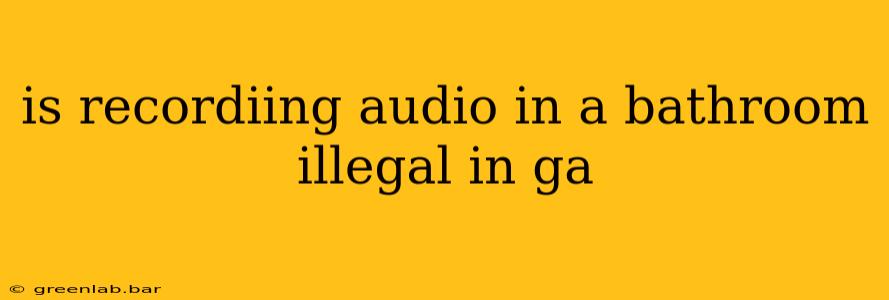Is Recording Audio in a Bathroom Illegal in Georgia? A Comprehensive Guide to Georgia's Eavesdropping Laws
Recording someone without their knowledge or consent can have serious legal ramifications, and the specifics depend heavily on location and circumstances. This guide explores the legality of recording audio in a bathroom in Georgia, clarifying the relevant laws and potential exceptions.
Georgia's Eavesdropping Statute: O.C.G.A. § 16-11-62
Georgia's law on eavesdropping, codified in O.C.G.A. § 16-11-62, prohibits the secret recording of conversations. The key elements to consider are:
- Secretly: The recording must be done without the knowledge or consent of at least one participant in the conversation.
- Conversation: This refers to an oral communication between two or more individuals. The definition can be somewhat broad and has been interpreted by Georgia courts to include situations where there's a reasonable expectation of privacy.
- Reasonable Expectation of Privacy: This is a crucial element. A person generally has a reasonable expectation of privacy in their home, including a bathroom. However, this expectation can be diminished by various factors.
Is a Bathroom a Place with a Reasonable Expectation of Privacy?
Generally, yes. Bathrooms are considered private spaces where individuals have a reasonable expectation that their activities won't be recorded without their knowledge or consent. The expectation is heightened in private residences, hotels, and other locations designed for personal use. Public restrooms offer significantly less privacy.
Exceptions to Georgia's Eavesdropping Law:
While generally illegal, there are exceptions to the law. These exceptions usually involve situations where one party to the conversation consents to the recording or where the recording is done for legitimate purposes. However, these exceptions are narrowly defined and difficult to invoke successfully without strong legal justification.
Examples of Potential Exceptions (These are NOT guarantees and require legal counsel):
- Consent: If one party to the conversation consents to the recording, it generally isn't illegal in Georgia. This consent needs to be clearly expressed and demonstrable.
- Law Enforcement: Law enforcement officers may be authorized to record conversations under specific circumstances, usually with a warrant or other legal authorization. This is highly regulated and requires strict adherence to legal procedure.
- One-Party Consent States: It's crucial to remember that Georgia is a "one-party consent" state. This means that only one participant in the conversation needs to consent to the recording. However, proving such consent can be challenging in a court of law.
Penalties for Violating Georgia's Eavesdropping Law:
Violating Georgia's eavesdropping law can result in severe penalties, including:
- Fines: Significant monetary penalties.
- Imprisonment: Possible jail time.
- Civil lawsuits: Victims can sue for damages, including emotional distress.
Conclusion:
Recording audio in a bathroom in Georgia without the knowledge or consent of at least one person involved is highly likely to be illegal. The reasonable expectation of privacy within a bathroom makes it a protected space under the law. While exceptions exist, they are narrow and require careful consideration. If you have any questions or concerns about recording audio, it's crucial to consult with a qualified legal professional in Georgia to understand your rights and obligations under the law. This information is for educational purposes and should not be considered legal advice.

